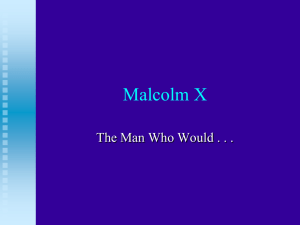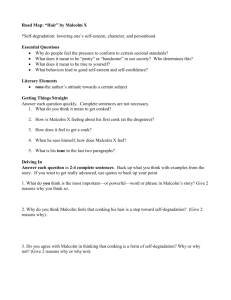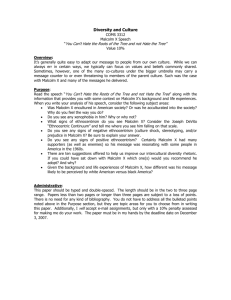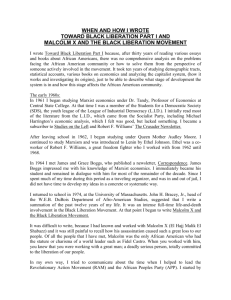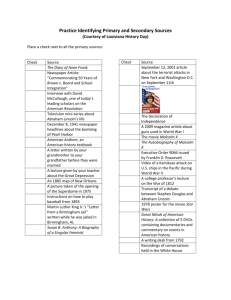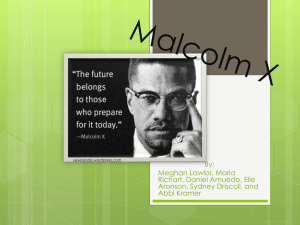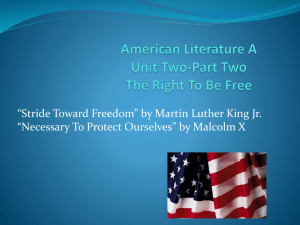Black Nationalism and the Call for Black Power
advertisement
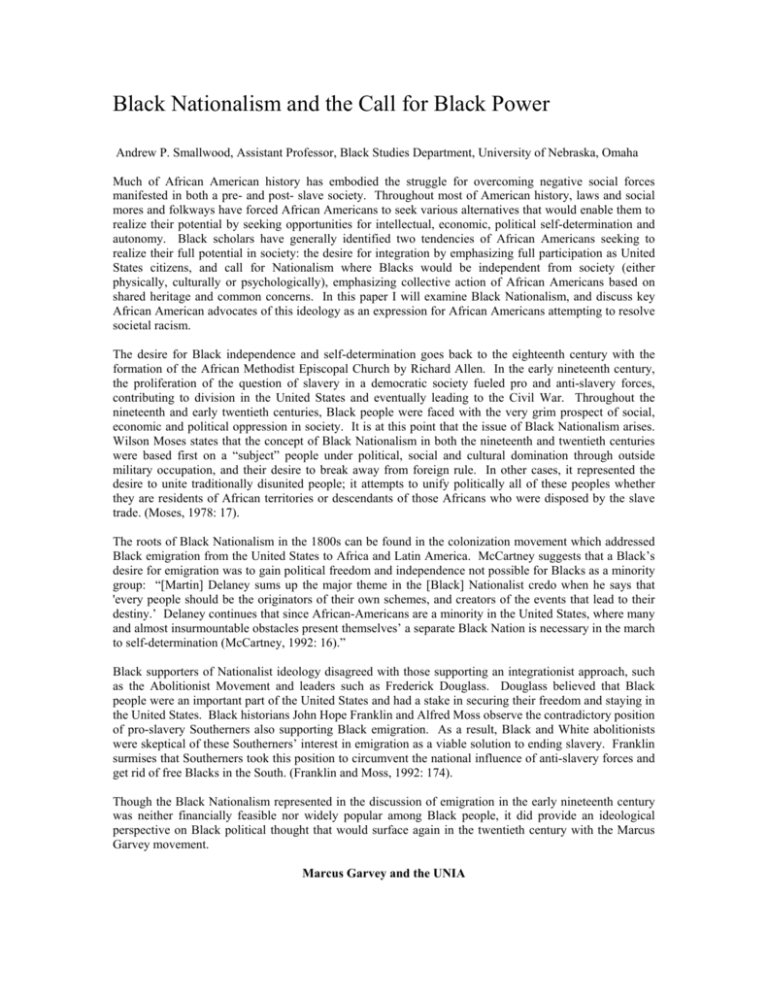
Black Nationalism and the Call for Black Power Andrew P. Smallwood, Assistant Professor, Black Studies Department, University of Nebraska, Omaha Much of African American history has embodied the struggle for overcoming negative social forces manifested in both a pre- and post- slave society. Throughout most of American history, laws and social mores and folkways have forced African Americans to seek various alternatives that would enable them to realize their potential by seeking opportunities for intellectual, economic, political self-determination and autonomy. Black scholars have generally identified two tendencies of African Americans seeking to realize their full potential in society: the desire for integration by emphasizing full participation as United States citizens, and call for Nationalism where Blacks would be independent from society (either physically, culturally or psychologically), emphasizing collective action of African Americans based on shared heritage and common concerns. In this paper I will examine Black Nationalism, and discuss key African American advocates of this ideology as an expression for African Americans attempting to resolve societal racism. The desire for Black independence and self-determination goes back to the eighteenth century with the formation of the African Methodist Episcopal Church by Richard Allen. In the early nineteenth century, the proliferation of the question of slavery in a democratic society fueled pro and anti-slavery forces, contributing to division in the United States and eventually leading to the Civil War. Throughout the nineteenth and early twentieth centuries, Black people were faced with the very grim prospect of social, economic and political oppression in society. It is at this point that the issue of Black Nationalism arises. Wilson Moses states that the concept of Black Nationalism in both the nineteenth and twentieth centuries were based first on a “subject” people under political, social and cultural domination through outside military occupation, and their desire to break away from foreign rule. In other cases, it represented the desire to unite traditionally disunited people; it attempts to unify politically all of these peoples whether they are residents of African territories or descendants of those Africans who were disposed by the slave trade. (Moses, 1978: 17). The roots of Black Nationalism in the 1800s can be found in the colonization movement which addressed Black emigration from the United States to Africa and Latin America. McCartney suggests that a Black’s desire for emigration was to gain political freedom and independence not possible for Blacks as a minority group: “[Martin] Delaney sums up the major theme in the [Black] Nationalist credo when he says that 'every people should be the originators of their own schemes, and creators of the events that lead to their destiny.’ Delaney continues that since African-Americans are a minority in the United States, where many and almost insurmountable obstacles present themselves’ a separate Black Nation is necessary in the march to self-determination (McCartney, 1992: 16).” Black supporters of Nationalist ideology disagreed with those supporting an integrationist approach, such as the Abolitionist Movement and leaders such as Frederick Douglass. Douglass believed that Black people were an important part of the United States and had a stake in securing their freedom and staying in the United States. Black historians John Hope Franklin and Alfred Moss observe the contradictory position of pro-slavery Southerners also supporting Black emigration. As a result, Black and White abolitionists were skeptical of these Southerners’ interest in emigration as a viable solution to ending slavery. Franklin surmises that Southerners took this position to circumvent the national influence of anti-slavery forces and get rid of free Blacks in the South. (Franklin and Moss, 1992: 174). Though the Black Nationalism represented in the discussion of emigration in the early nineteenth century was neither financially feasible nor widely popular among Black people, it did provide an ideological perspective on Black political thought that would surface again in the twentieth century with the Marcus Garvey movement. Marcus Garvey and the UNIA Born in St. Ann’s Bay, Jamaica in 1887, Marcus Mosiah Garvey was raised in a majority Black society. Scipio Colin notes: “...Garvey was afforded opportunities for learning that were not available to the majority of his people. His father was well-read and had established a library in his home. His Godfather for whom he worked as apprentice printer, also kept a library and understood the power of the “word” (Colin, 1996: 48).” He eventually arrives in the United States in 1916 and seeks to provide a program for millions of disenfranchised Blacks to address their economic, political and educational plight during the early twentieth century. Garvey was attracted to aspects of Booker T. Washington’s program of economic independence through self-help, which he felt would be more practical for the masses of poor Black people. (Karenga, 1994: 157). In 1918, Garvey founded the Universal Negro Improvement Association (UNIA) as a better alternative for Black people than interracial organizations such as the NAACP and the National Urban League. Because of the fierce resistance to Black integration among Whites in the U.S., Garvey believed Black separation would be the best chance for Blacks to realize their full potential as human beings culturally socially, politically, and economically. Colin notes that Garvey’s UNIA had a strong educational component:...They would learn to believe in themselves, in their race, and it was through the UNIA-ACL sponsored programs: The UNIA-ACL Civil Service Board, The Universal Black Cross Nurses Corps, The African Legions of the UNIA-ACL, The Universal African Motor Corps, The Black Star Ship Line, Universal Factories Corporation; activities: The International Conventions of the Negro Peoples of the World; The Women’s Industrial Exhibition; educational institutions: The School of African Philosophy, the Booker T. Washington University, and Liberty University; and instructional materials: The Universal Negro Catechism, The Negro World, and the Black Man, that African [Americans] would receive the type of education they needed, education of self (Colin, 1996: 54). Garvey clearly used education in the form of programs and newspapers to teach Black people about economic and social uplift through collective action. Garvey’s socio-political philosophy of Black Nationalism, expressed in the UNIA, emphasized cultural pride, social separation and economic empowerment. When examining the importance of Garvey for African Americans, Scipio Colin states: No other race leader had inspired such hope in the hearts of the people since the orations of Frederick Douglass, and incorporated these inspirations (their aspirations) into practical adult education programs (Colin, 1996: 56). His emphasis on racial pride, political and economic self-determination, proved to be a powerful message for African Americans during the early twentieth century. An important influence on Malcolm X’s political ideology was Black Nationalism. Malcolm pointed out in his autobiography that his parents were followers of Marcus Garvey and members of the UNIA, thus impacting Malcolm and siblings at an early age. (Malcolm X, 1992: 1-3). This early exposure to Black Nationalism was important in providing a foundation that would prepare Malcolm to later embrace Black Nationalism fully after his departure from the Nation of Islam (Malcolm X, 1992: 3-7). Malcolm X: Political Influences and Evolution The influence of Black Nationalism can also be found in the ideological formation of the Nation of Islam in the 1930s. (Essien-Udom, 1962: 18). After becoming a member of the NOI in the late 1940s, Malcolm X adhered to the organization’s adaptation of Garvey’s socio-political philosophy of Black Nationalism, emphasizing group empowerment through cultural pride, economic development and social separation. During the period of 1953 through early 1964, Malcolm was restricted to a position of non-engagement on Civil Rights and other social issues affecting African Americans. As leader of the NOI, Elijah Muhammad forbade all members from participation in Civil Rights organizations, marches or any political activity in general (Clegg, 1997: 149-157; Perry, 1990: 207-212; and Essien-Udom, 1962: 177-178). During the late 1950s the NOI moved away from the political rhetoric of Black Nationalism and focused more on religious teachings to address social problems. It was during the period of the early 1960s that Malcolm, an advocate for improving African American life, began to privately question the NOI’s role in improving the conditions of African Americans. Malcolm X believed that the organization, with its resources, could do more to address the plight of all African Americans and not just Black Muslims. His views were probably influenced, by the action oriented organizations such as the Southern Christian Leadership Conference (SCLC) and student groups like the Student Non-violent Coordinating Committee (SNCC) which became the foundation of the Civil Rights Movement of the late 1950s and mid 1960s. In 1963 Malcolm began to change his public rhetoric, aligning himself more with Black Nationalist philosophy. It was this change that would lead him to seek cooperation with the politically active organizations of the Civil Rights Movement (Goldman, 1979, 115-116). Research on Malcolm X as a political figure examines his political ideology and use of his power as an organizational leader to develop a greater sphere of influence for the Nation of Islam in the African American community. As National Representative and minister of the New York Mosque, Malcolm was in the position to hold a national forum to examine the African American condition in the United States. Thet extent to which he changed his political ideology in the last year of his life is the subject of debate and discussion. Malcolm X’s position on politics and the African American community, at the very least, indicates his attempt to internationalize the struggle against racism, linking Black oppression in the U.S. to colonial oppression of Blacks on the African continent. This ultimately leads to Malcolm embarking on two trips to Africa in 1964 in an effort to solicit the support of African leaders. (Malcolm X, 1992: 350363; Clarke, 1990: 215-216; Goldman, 1979: 206-208). Several authors make a closer examination of Malcolm X showing that he adopted a philosophy of Black Nationalism, and, thus laid the groundwork for the Black Power and Cultural Nationalist Movements of the late 1960s Karenga, 1994: 175-176). To broaden the struggle against Black oppression, Malcolm X sought and received international exposure. When examining diverse views on Malcolm X’s political life, a common theme discusses Malcolm X’s activism to relieve poverty and suffering in African American communities. In the course of his political life, Malcolm X worked within local Black communities organizing residents to join the NOI as an answer to their social struggles. With his rise in the organization, he then used the media as a national voice for Black suffering in society. After his departure from the NOI, Malcolm X attempted to internationalize the struggle for African Americans and include a more diverse group of people in the struggle for Black self-determination. Conclusion Black Nationalism as an alternative to integration goes back over one hundred years, as Black leaders explored alternative political and social ideology to address racial discrimination against African Americans in the United States. In the Twentieth Century, Marcus Garvey and Malcolm X became the two dominant figures emphasizing traditional Black Nationalism and influencing a generation of individuals and organizations to implement their ideology. The Nation of Islam, led by Elijah Muhammad and Malcolm X, The Student Non-violent Coordinating Committee, led by Stokely Carmichael’s call for Black power in the late 1960s, The Black Panther Party, led by Bobby Seale and Huey P. Newton and many other grassroots organizations used Nationalist philosophy advocated by Marcus Garvey and Malcolm X, to address problems of poverty inadequate housing and police brutality, to take ownership of their communities through collective social action. References Clarke, J. H. (ed.). (1990). Malcolm X:The Man and His Times. Trenton, NJ.: African World Press. Clegg, C.A.III. (1997). An Original Man: The Life and Times of Elijah Muhammad. New York: St. Martin’s Press. Colin, S.A.J.III. (1996). “Marcus Garvey: Africentric Adult Education for Self-Ethnic Reliance” in Freedom Road: Adult Education of African Americans Peterson, E. (ed.). Malabar, FL.: Krieger Publishing. Essien-Udom, E.U. (1962). Black Nationalism: A search for Identity. Chicago: University of Chicago Press. Franklin, J. H. & Moss, A. (1994) From Slavery to Freedom. (7th ed.) New York: McGraw-Hill. Goldman, P. (1979). The Death and Life of Malcolm X. Urbana, IL.: University of Illinois Press. Karenga, M. (1994) Introduction to Black Studies. Los Angeles: University of Sankore Press. Malcolm X. (1992). The Autobiography of Malcolm X. New York: Ballantine Books. McCartney, J. (1992). Black Power Ideologies: An Essay in African American Political Thought. Philadelphia, PA.: Temple University Press. Moses, W.J. (1978). The Golden Age of Black Nationalism, 1850-1925. Camden, NJ.: Archon Books. Perry, B. (1990). Malcolm: The Life of a Man Who Changed Black America. Barrytown, NY.: Station Hill Press.
